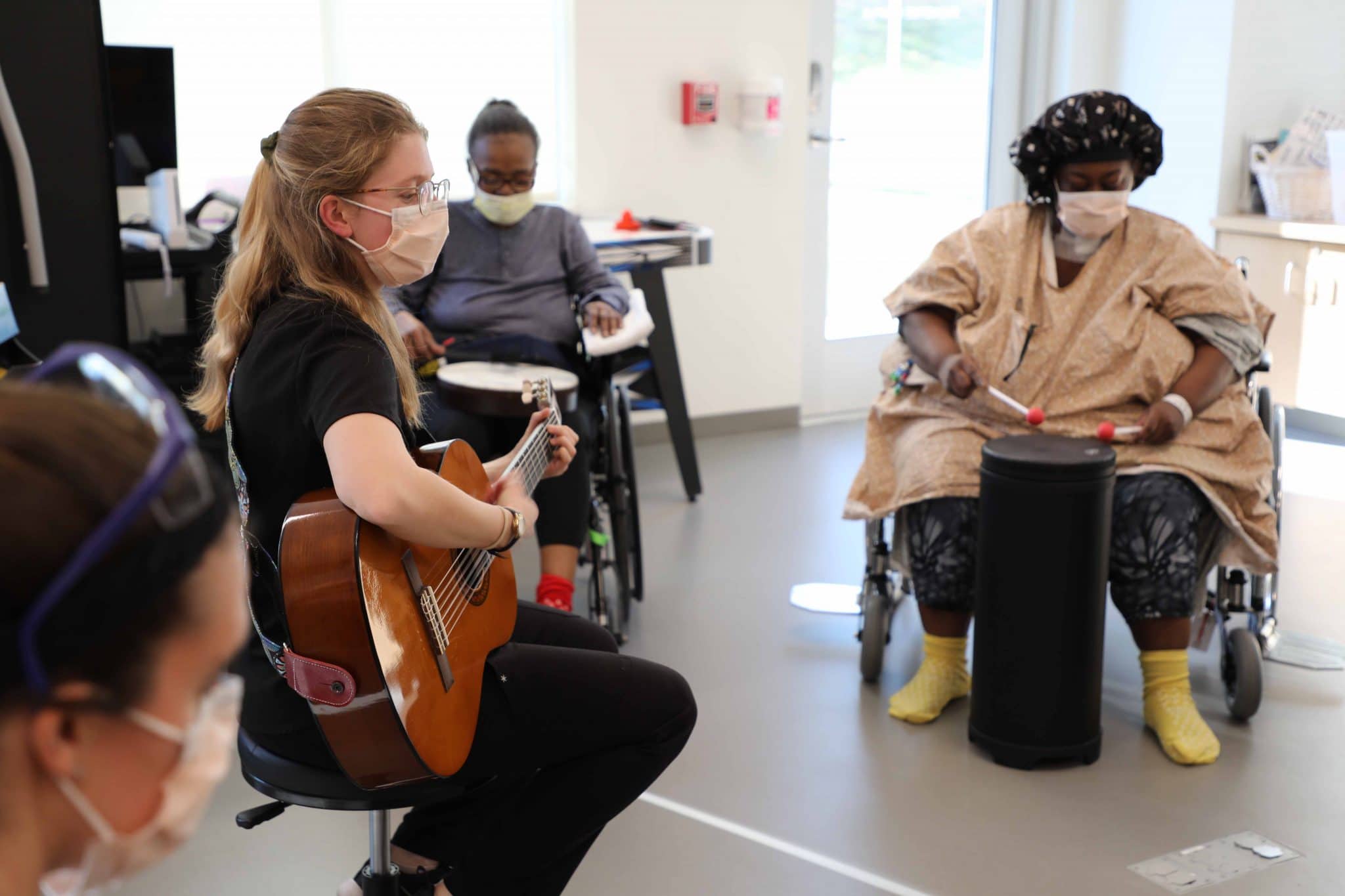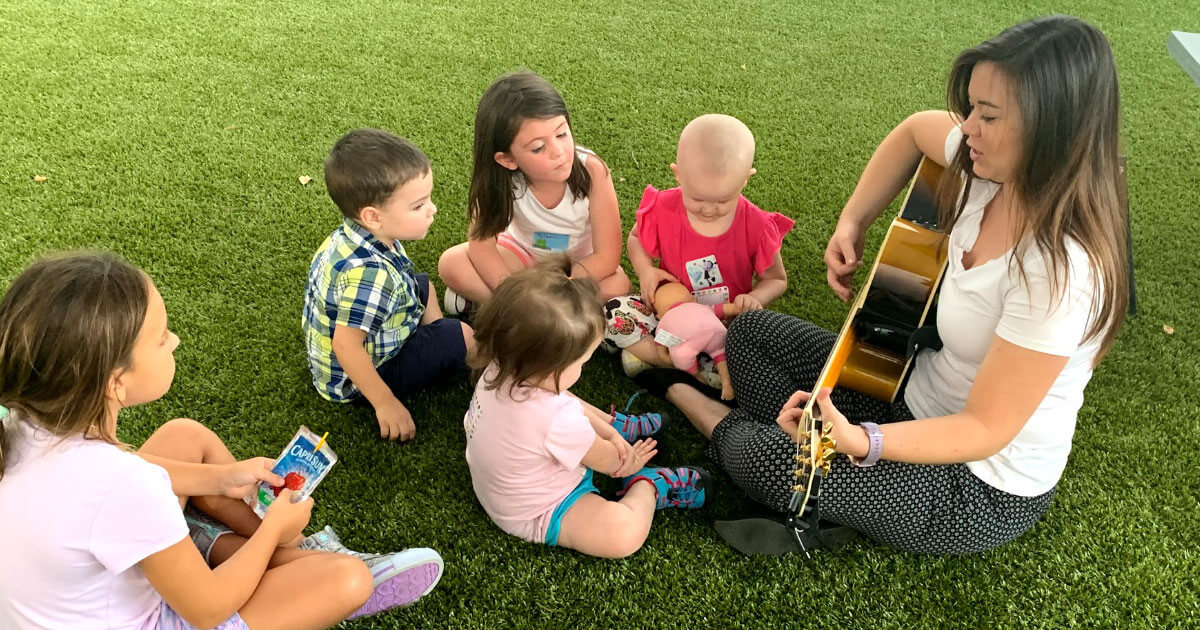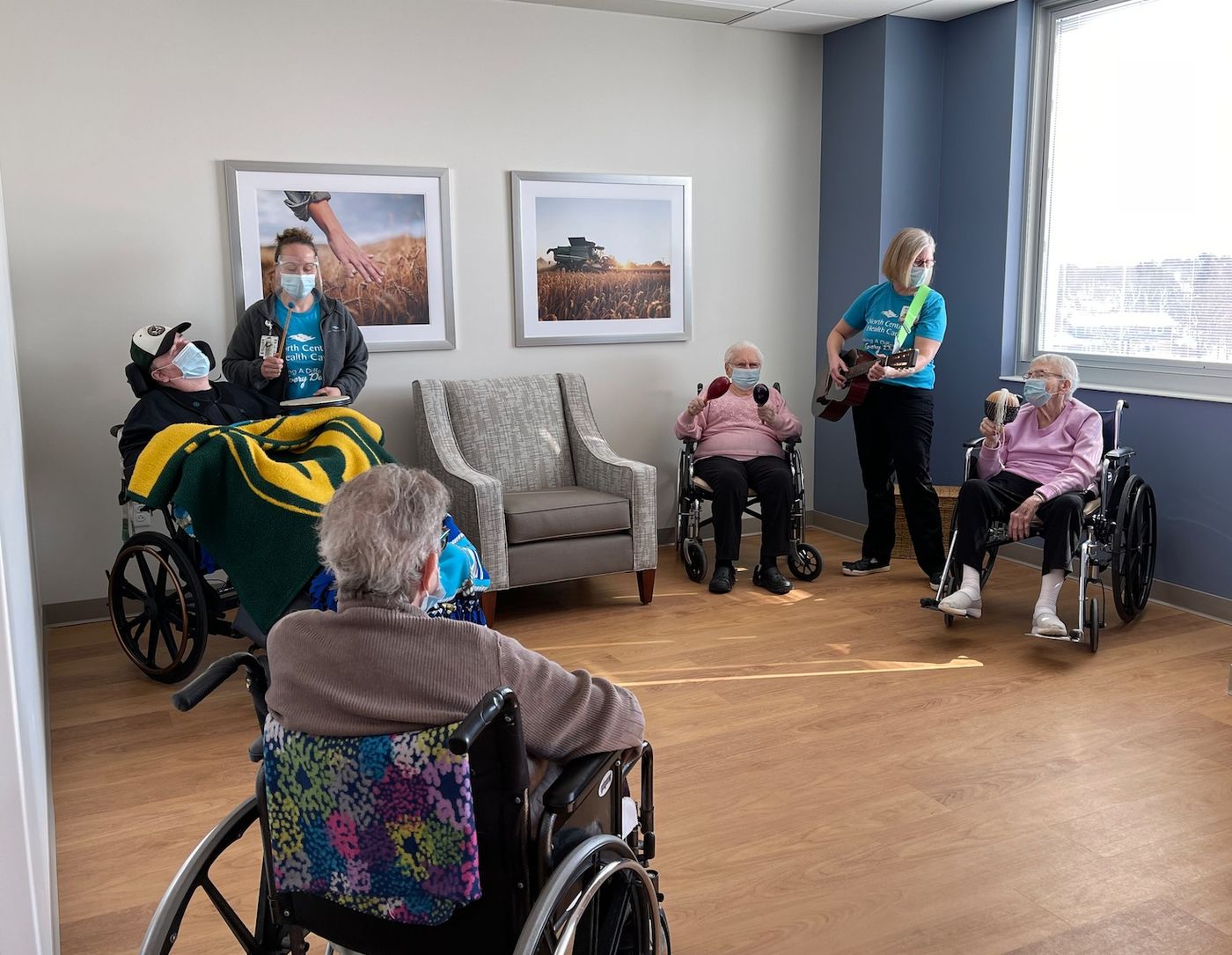Home>Events & Info>Music Therapy>Why Are Music Therapy Internships Not Paid?


Music Therapy
Why Are Music Therapy Internships Not Paid?
Published: February 2, 2024
Discover the reasons behind unpaid music therapy internships and how they impact aspiring therapists. Gain insights into the field of music therapy.
(Many of the links in this article redirect to a specific reviewed product. Your purchase of these products through affiliate links helps to generate commission for AudioLover.com, at no extra cost. Learn more)
Table of Contents
Introduction
Welcome to the world of music therapy, a unique and powerful form of therapy that utilizes the healing power of music to improve the well-being of individuals. It combines the artistic elements of music with the science of therapy to address physical, emotional, cognitive, and social needs.
Aspiring music therapists often embark on a journey to gain practical experience through internships. These internships allow students to apply their knowledge in real-world settings, working alongside experienced professionals in various healthcare, education, and community settings. However, one common aspect that often raises eyebrows is the fact that many music therapy internships are unpaid.
Unpaid internships have been a topic of debate and discussion in various industries, and music therapy is no exception. While there are valid reasons for this practice, it has also sparked concerns and raised questions about the fairness and sustainability of such arrangements. In this article, we will delve into the factors that contribute to unpaid music therapy internships and explore the implications it has on the music therapy profession.
Overview of Music Therapy Internships
Music therapy internships serve as a crucial stepping stone for aspiring music therapists, providing them with the opportunity to gain practical experience in their field. These internships typically last for a specified duration, ranging from a few months to a year, depending on the program requirements.
During their internships, students work under the supervision of experienced music therapists, applying their theoretical knowledge in real-world settings. This hands-on experience allows them to develop clinical skills, hone their therapeutic techniques, and gain confidence in working with diverse populations.
Music therapy internships can take place in a variety of settings, including hospitals, rehabilitation centers, schools, mental health facilities, and community organizations. This diversity enables students to gain exposure to different client populations and refine their abilities to address a wide range of needs.
In addition to working directly with clients, interns are often involved in case management, treatment planning, documentation, and collaboration with interdisciplinary teams. This comprehensive experience helps interns understand the various facets of the profession and prepares them for the challenges they will face as music therapists.
Internships also provide an opportunity for students to establish professional connections, receive mentorship, and network with music therapy professionals. These connections can be invaluable when seeking employment after graduation and can open doors to future career opportunities.
While internships are an essential component of music therapy education, it is important to note that not all internships are created equal. The quality and structure of internships can vary depending on factors such as the program and location. Accredited music therapy programs often have specific internship requirements to ensure that students receive well-rounded and comprehensive training.
Reasons for Unpaid Music Therapy Internships
There are several reasons why music therapy internships are often unpaid. Understanding these reasons can provide insight into the complex dynamics that influence internship arrangements in the field. Here are some of the key factors contributing to unpaid internships:
- Lack of funding: Many organizations that offer music therapy internships operate on limited budgets. They may struggle to allocate funds for compensating interns due to financial constraints.
- Non-profit nature: A significant number of music therapy internships are offered by non-profit organizations, such as hospitals or community centers. These organizations rely on donations and grants to sustain their programs, which may not be sufficient to cover internship stipends.
- Education requirement: Music therapy internships are typically considered part of the educational curriculum. Since interns are still students, they are not viewed as fully qualified professionals and may not be eligible for paid positions.
- Supervision and training costs: Providing supervision and training to interns requires time and resources from experienced professionals. Non-payment of internships helps offset these costs associated with mentorship and guidance.
- Experience-driven compensation: Some argue that internships provide invaluable experiential learning opportunities that can compensate for the lack of monetary payment. The focus is on the learning experience and skill development rather than financial remuneration.
- Ethical considerations: There are ethical debates regarding whether it is fair to profit from client services provided by interns who are still in the learning phase of their professional development.
It is essential to note that while unpaid internships prevail in the field, there are exceptions where interns receive compensation for their work. These exceptions may include internships at private practices, institutions with larger budgets, or programs that have secured specific funding for student stipends.
The Role of Accreditation in Determining Payment
The accreditation process plays a significant role in defining the standards and requirements for music therapy internships. Accredited music therapy programs are evaluated based on their adherence to specific criteria set by accrediting bodies, such as the American Music Therapy Association (AMTA) and the Certification Board for Music Therapists (CBMT).
Accreditation ensures that music therapy programs provide a comprehensive education that meets the industry standards and prepares students for professional practice. As part of this process, internship requirements are outlined to ensure that students gain the necessary clinical experience.
Accreditation does not explicitly mandate whether internships should be paid or unpaid. However, it does emphasize the importance of the quality and structure of internships. Accredited programs are expected to provide internships that meet certain eligibility criteria and learning objectives.
While payment for internships is not a requirement, accredited programs are encouraged to consider the financial sustainability of internships and explore options for student compensation. Accreditation bodies recognize the value of providing financial support to students during their internships as it can alleviate financial burdens and increase accessibility to a wider range of prospective music therapists.
Accreditation also ensures that internships offer adequate supervision, mentorship, and opportunities for professional growth. The accreditation process evaluates how internships contribute to students’ skill development, critical thinking, and integration of theoretical concepts into practice.
However, the decision of whether to offer paid internships ultimately lies in the hands of the institutions and organizations providing the internships. Budgetary considerations, available resources, and organizational policies often influence these decisions, even within accredited programs.
It is important for students to research and consider the accreditation status of their music therapy programs when evaluating internship opportunities. Accredited programs are more likely to offer internships that meet industry standards and provide a solid foundation for future music therapists.
Benefits and Drawbacks of Unpaid Internships
Unpaid music therapy internships come with their own set of benefits and drawbacks. Here, we explore both sides of the equation to provide a balanced perspective:
- Benefits:
- Learning experience: Internships provide valuable hands-on experience and the opportunity to apply theoretical knowledge in real-world settings. Interns gain practical skills, develop confidence, and enhance their understanding of the profession and its various challenges.
- Professional connections: Internships allow students to network with music therapy professionals, establish mentorship relationships, and make connections within the field. These relationships can lead to future job opportunities and provide a support system as they navigate their career.
- Resume building: Having internships on their resumes demonstrates to potential employers that students have practical experience in the field. This can give them a competitive edge when applying for music therapy positions after graduation.
- Exposure to diverse populations: Internships often take place in various settings, exposing students to a wide range of client populations and their unique needs. This diversity enriches their understanding of music therapy and prepares them to work with diverse groups of individuals.
- Drawbacks:
- Financial burden: Unpaid internships can be financially challenging for students who need to cover living expenses, transportation costs, and possibly education loans. This can limit the accessibility of internships to students from lower-income backgrounds or those with financial responsibilities.
- Equity concerns: Unpaid internships may perpetuate inequities in the profession by favoring students who can afford to work for free and disadvantaging those who cannot. This can contribute to a lack of diversity and perpetuate social and economic disparities in the music therapy field.
- Workload and supervision: While interns gain valuable experience, they may also take on a significant workload and responsibility without financial compensation. The level of supervision and support can vary, and some interns may feel overwhelmed or inadequately supported during their internships.
- Perception of value: The absence of financial compensation for internships may diminish the perceived value of music therapy as a profession. It can send a message that the work of music therapists, even during the training phase, is not worthy of fair compensation.
Considering these benefits and drawbacks is crucial for students when making decisions about internships. It is essential for the music therapy profession as a whole to address the challenges of unpaid internships and work towards creating more equitable and accessible opportunities for aspiring music therapists.
The Impact on the Music Therapy Profession
The prevalence of unpaid music therapy internships has a significant impact on the profession as a whole. Here are some key ways in which unpaid internships impact the music therapy profession:
- Limiting diversity and inclusivity: Unpaid internships can create barriers for students from lower socioeconomic backgrounds, potentially limiting the diversity and inclusivity of the music therapy profession. This lack of representation can hinder the field’s ability to effectively serve diverse populations and perpetuate existing social and economic disparities.
- Financial burden on students: Unpaid internships place a financial burden on students who may struggle to cover living expenses, transportation costs, and student loans. This can deter talented individuals from pursuing a career in music therapy or can limit their choices in terms of internship opportunities.
- Perception of value: The absence of financial compensation for internships can contribute to the perception that the work of music therapists is undervalued. This can impact the professional standing of music therapy within the broader healthcare and therapy fields and may make it more challenging to advocate for fair compensation in the future.
- Skills gap: Unpaid internships may lead to a gap in practical skills and experience among music therapy professionals. Students who cannot afford unpaid internships may graduate with less hands-on training, potentially affecting their ability to competently practice music therapy.
- Unequal access to opportunities: Unpaid internships often favor students who can afford to work for free, creating unequal access to internship opportunities. This can result in a lack of diversity in terms of geographic location, client populations served, and types of internship experiences gained.
Recognizing the impact of unpaid internships on the profession, efforts have been made to advocate for change and promote paid internships. Professional organizations like the American Music Therapy Association (AMTA) and the Certification Board for Music Therapists (CBMT) encourage fair compensation for interns and highlight the importance of accessible and equitable internship opportunities.
It is essential for the music therapy profession to address the challenges posed by unpaid internships and strive towards creating a more inclusive and sustainable model. This can be achieved through increased funding, partnerships with organizations that value and support paid internships, and advocacy at both the institutional and legislative levels. By ensuring fair compensation and accessibility for students, the music therapy profession can thrive and better serve the needs of individuals and communities.
Efforts to Advocate for Paid Internships
The issue of unpaid music therapy internships has not gone unnoticed within the profession, and efforts have been made to advocate for fair compensation and support for interns. Here are some of the key initiatives and strategies aimed at promoting paid internships in music therapy:
- Professional organization support: Leading music therapy organizations, such as the American Music Therapy Association (AMTA) and regional associations, have taken a stance in support of fair compensation for music therapy interns. They provide resources, guidelines, and recommendations to support the payment of internships and promote equitable opportunities.
- Legislative advocacy: Some music therapy organizations have engaged in legislative efforts to advocate for the recognition and compensation of music therapy interns. This includes seeking policy changes at the state or federal level to encourage paid internships and secure funding for student stipends.
- Creating partnerships: Collaboration between educational institutions and external organizations can help create internship opportunities that come with financial support. Establishing partnerships with healthcare systems, schools, and community organizations that recognize the value of music therapy internships can lead to paid positions for students.
- Fundraising efforts: Some universities, organizations, and music therapy programs have developed fundraising campaigns to raise funds specifically designated for student stipends. These initiatives rely on the generosity of donors who believe in the importance of providing financial support to aspiring music therapists during their internships.
- Initiating discussions and awareness: Music therapy professionals and educators have actively engaged in discussions and raised awareness about the implications of unpaid internships. By highlighting the challenges faced by students and the profession, they aim to stimulate dialogue and encourage change within the field.
These efforts demonstrate a growing recognition of the importance of supporting music therapy interns and the need for fair compensation. While progress is being made, there is still work to be done to ensure that all music therapy interns have access to paid opportunities.
Promoting paid internships not only benefits students by alleviating financial burdens and increasing accessibility, but it also contributes to the professionalization of music therapy as a whole. Recognizing the value of interns’ contributions and providing fair compensation sets a precedent for the profession and positions it as a legitimate and respected field of healthcare and therapy.
As the discussion around paid internships continues to gain momentum, it is crucial for stakeholders, including educational institutions, accrediting bodies, healthcare organizations, and policy makers, to collaborate and find sustainable solutions that prioritize the well-being and professional development of music therapy interns.
Conclusion
The issue of unpaid music therapy internships sparks debate and raises questions about the fairness and sustainability of such arrangements. While there are reasons for unpaid internships, such as limited funding and the educational nature of internships, it is important to consider the impact on aspiring music therapists and the profession as a whole.
Music therapy internships play a vital role in preparing students for professional practice. They provide practical experience, exposure to diverse populations, and the opportunity to establish professional connections. However, the lack of financial compensation can create barriers for students, limit diversity and inclusivity, and perpetuate disparities within the profession.
Efforts to advocate for paid internships are gaining momentum within the music therapy profession. Professional organizations, legislative advocacy, partnerships, fundraising, and increasing awareness are some of the strategies being employed to promote fair compensation for interns. These efforts aim to create more accessible and equitable opportunities and to elevate the value and recognition of music therapy as a profession.
It is essential for all stakeholders, including educational institutions, accrediting bodies, organizations, and policymakers, to collaborate and find sustainable solutions. By addressing the challenges of unpaid internships and ensuring fair compensation, the music therapy profession can attract a diverse range of talented individuals and provide them with the support they need to succeed.
In conclusion, while unpaid music therapy internships remain common, there is a growing movement to advocate for change and advocate for fair compensation. By recognizing the value and contributions of music therapy interns, promoting inclusivity and accessibility, and fostering a sustainable professional environment, the music therapy profession can continue to grow and thrive, ultimately improving the lives of individuals through the healing power of music.











